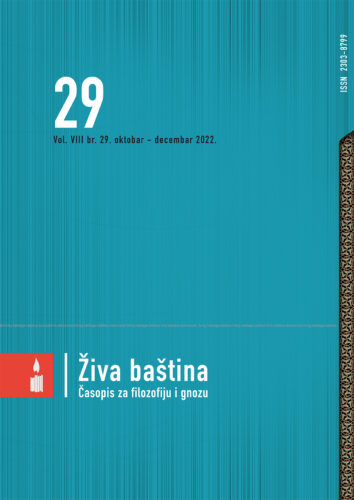UDK 1 Ibn Sina
Uz svoju teoriju, o kojoj je mnogo raspravljano, a koja glasi da su ljudi trajno, makar samo prešutno, samosvjesni, Avicena dodaje da su kod aktivno svjesnih samospoznaja subjekt i objekt mišljenja istovjetni. On i na ljude i na Boga primjenjuje slogan da je samospoznavalac “um, umujući i umovano (‘aql, ‘āqil, ma‘qūl)”. Rad pred vama ispituje reakcije na ovu ideju na islamskom Istoku od 12. do 13. stoljeća. Širok raspon filozofa, kao što su Abū l-Barakāt al-Baghdādī, Fahruddīn al-Rāzī, al-Šahrastānī, Šarafuddīn al-Mas'ūdī, al-Abharī, al-Āmidī i Nasīruddīn al-Ṭūsī iznio je i odbacio prigovore na Avicenin stav. Jedan od središnjih problema bio je taj što se prema široko prihvaćenim definicijama znanja, prema kojima je znanje reprezentativno, ili relacija, čini nemogućim da subjekt i objekt znanja budu isto. Odgovori na ovaj problem uključivali su ideju da je samospoznavalac “prisutan” sam sebi, ili da su ovdje subjekt i objekt različiti samo po “aspektu” (i‘tibār).
The Simplicity Of Self-Knowledge After Avicenna
Peter Adamson
Department VI for Late Antiquity and Arabic Philosophy
Abstract
Alongside his much-discussed theory that humans are permanently, if only tacitly, self-aware, Avicenna proposed that in actively conscious self-knowers the subject and object of thought are identical. He applies to both humans and God the slogan that the self-knower is “intellect, intellecting, and object of intellection (‘aql, ‘aqil, ma‘qul)”. This paper examines reactions to this idea in the Islamic East from the 12th-13th centuries. A wide range of philosophers such as Abu al-Barakat al-Baghdadi, Fahr al-Din al-Razi, al-Shahrastani, Sharaf al-Din al-Mas'udi, al-Abhari, al-Amidi, and Nasir al-Din al-Tusi raised and countered objections to Avicenna's position. One central problem was that on widely accepted definitions of knowledge – according to which knowledge is representational or consists in a relation – it seems impossible for the subject and object of knowledge to be the same. Responses to this difficulty included the idea that a self-knower is “present” to itself, or that here subject and object are different only in “aspect (i‘tibar)”.

